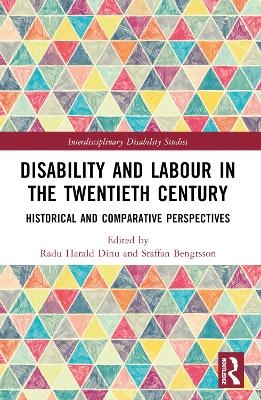
Disability and Labour in the Twentieth Century
Routledge (Verlag)
978-1-032-32767-9 (ISBN)
The book’s contributors demonstrate that the nexus between labour and disability in modern, industrialised societies resists easy generalisations, as marginalisation and integration were often two sides of the same coin: While the experience of many disabled people has been marked by exclusion from mainstream production, labour also became a vehicle for integration and emancipation. Addressing one of the research gaps of the disability history field, which has long been dominated by British and North American perspectives, the book sheds light on less-studied examples from Scandinavian countries and Eastern Europe including Czechoslovakia, Poland, the Soviet Union, Bulgaria and Romania.
Cutting across national, cultural and class divides the volume provides a springboard for reflections on common experiences of disability and labour during the twentieth century. It will be of interest to all scholars and students working in the field of disability studies, sociology and labour history.
Radu Harald Dinu is Senior Lecturer in History at the School of Education and Communication, Jönköping University, Sweden. His research focusses on modern and contemporary history of Eastern Europe and covers a wide range of themes, from the history of fascism to how communism shaped experiences of disability in Eastern Europe. Staffan Bengtsson is Assistant Professor of Social Work and Associate Professor of Disability Research at the School of Health and Welfare, Jönköping University, Sweden. At the centre of his ongoing research stands disability as a societal phenomenon in relation to various theoretical perspectives and models, in which sociocultural dimensions are accentuated in connection to religious and ideological value systems.
Introduction: Disability and Labour in Modern Societies. 1.The Right to Work: Disability Awareness and Activism in Twentieth-Century Canada. 2.Gendered Labour and Consumer Culture in the Multiple Sclerosis Associations in Sweden and West Germany. 3.‘Salaries, Not Benefits!’ Disability Rights Activism and the Right to Work in the Scandinavian Welfare States. 4.For Society and the Individual: Disability and Work in Post-War Sweden. 5.From Industrialised to Knowledge-Based Societies: The Metamorphosis of the French Disabled Worker since 1957. 6.Warriors into Workers: Soviet Labour Policy and Disabled Veterans of the Great Patriotic War. 7.Beyond Labour: Socialist Disability Policy in the Realm of Mental Health. 8.Socialist Humanism, Work, and Disability in Socialist Romania: The Legal Regime of the Third-Degree Invalidity Pension, 1949–1989. 9.Becoming a Productive Citizen: Labour and the Blind Community in Socialist Romania. 10.Vocational Guidance in Socialist Czechoslovakia and the Context of Global and National Histories of Disability. 11.Work and Life Courses of Polio Survivors in Socialist Poland. Afterword.
| Erscheinungsdatum | 13.02.2023 |
|---|---|
| Reihe/Serie | Interdisciplinary Disability Studies |
| Zusatzinfo | 2 Line drawings, black and white; 21 Halftones, black and white; 23 Illustrations, black and white |
| Verlagsort | London |
| Sprache | englisch |
| Maße | 156 x 234 mm |
| Gewicht | 462 g |
| Themenwelt | Geschichte ► Teilgebiete der Geschichte ► Kulturgeschichte |
| Sozialwissenschaften ► Pädagogik ► Sozialpädagogik | |
| Sozialwissenschaften ► Politik / Verwaltung ► Staat / Verwaltung | |
| Sozialwissenschaften ► Soziologie | |
| ISBN-10 | 1-032-32767-7 / 1032327677 |
| ISBN-13 | 978-1-032-32767-9 / 9781032327679 |
| Zustand | Neuware |
| Informationen gemäß Produktsicherheitsverordnung (GPSR) | |
| Haben Sie eine Frage zum Produkt? |
aus dem Bereich


